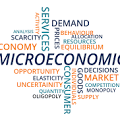Course info

Economics is the social science that studies how individuals, businesses, governments, and societies make choices about allocating limited resources to satisfy their unlimited wants and needs. It examines how people use scarce resources like time, money, labor, and raw materials to produce goods and services and distribute them among various groups.
Economics is typically divided into two main branches:
Microeconomics – Focuses on individual and business decision-making, analyzing factors like supply and demand, pricing, consumer behavior, and market structures.
Macroeconomics – Looks at the economy as a whole, studying broader issues such as inflation, unemployment, economic growth, national income, and fiscal and monetary policy.
Key concepts in economics include:
Scarcity: Resources are limited, so choices must be made.
Opportunity cost: The value of the next best alternative given up when a choice is made.
Supply and demand: How prices and quantities of goods and services are determined in markets.
Incentives: Factors that motivate individuals and organizations to make decisions.
Efficiency and equity: How well resources are used and how fairly wealth is distributed.
Economics helps in understanding real-world issues such as poverty, inequality, globalization, and environmental sustainability, and plays a critical role in shaping public policies and business strategies.
